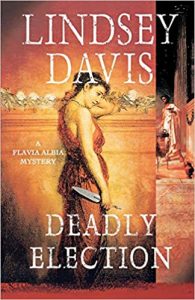 The Graveyard of the Hesperides (Flavia Albia Mystery, #4) by Lindsey Davis
The Graveyard of the Hesperides (Flavia Albia Mystery, #4) by Lindsey Davis Format: eARC
Source: supplied by publisher via NetGalley
Formats available: hardcover, paperback, ebook, audiobook
Genres: historical fiction, historical mystery
Series: Flavia Albia #4
Pages: 336
Published by Minotaur Books on April 14, 2016
Purchasing Info: Author's Website, Publisher's Website, Amazon, Barnes & Noble, Kobo, Bookshop.org, Better World Books
Goodreads
In first century Rome, Flavia Albia, the daughter of Marcus Didius Falco, has taken up her father's former profession as an informer. On a typical day, it's small cases—cheating spouses, employees dipping into the till—but this isn't a typical day.
Her beloved, the plebeian Manlius Faustus, has recently moved in and decided that they should get married in a big, showy ceremony as part of beginning a proper domestic life together. Also, his contracting firm has been renovating a rundown dive bar called The Garden of the Hesperides, only to uncover human remains buried in the backyard. There have been rumors for years that the previous owner of the bar, now deceased, killed a bar maid and these are presumably her remains. In the choice between planning a wedding and looking into a crime from long ago, Albia would much rather investigate a possible murder. Or murders, as more and more remains are uncovered, revealing that something truly horrible has been going on at the Hesperides.
As she gets closer to the truth behind the bodies in the backyard, Albia's investigation has put her in the cross-hairs—which might be the only way she'll get out of the wedding and away from all her relatives who are desperate to 'help.'
My Review:
 No matter how much technology advances, human nature remains pretty much the same, and that’s a big part of what makes historical mysteries so much fun AND so absorbing. That’s especially true in the Marcus Didius Falco series and its literal daughter-series, Flavia Albia, of which this book, The Graveyard of the Hesperides, is the fourth.
No matter how much technology advances, human nature remains pretty much the same, and that’s a big part of what makes historical mysteries so much fun AND so absorbing. That’s especially true in the Marcus Didius Falco series and its literal daughter-series, Flavia Albia, of which this book, The Graveyard of the Hesperides, is the fourth.
The setting is the Roman Empire in the first century A.D., often, but not always, in Rome itself, as this book is. Flavia Albia is a private informer – read that as private investigator – following in the footsteps of her very much alive but only occasionally meddling adopted father, Marcus Didius Falco, the protagonist of the earlier series.
Falco married above himself in the earlier series, the son of a relatively poor and constantly scheming plebeian family who married a Senator’s daughter. As The Graveyard of the Hesperides opens – both literally and figuratively – Flavia Albia is about to do the same.
Which is where the domestic half of the story kicks in, as the wedding is approaching quickly – as are her soon-to-be in-laws. Flavia loves her fiance – but his family, well, not so much. And very much vice-versa.
In other words, she’s happy to be marrying HIM, but not at all sure about ‘THEM’. A set of conflicted feelings that many feel on the eve of their wedding to someone who seems like the one sane person in a family of crackpots. And not that her intended wouldn’t feel justified having the exact same trepidations about Flavia’s family, as readers already know that Falco takes a bit of getting used to at the best of times!
But that’s the domestic half of the story, the part that in any mystery series centers on the life of the investigator and the gang of helpers and hinderers that coalesce around them as they poke their noses into places that someone inevitably believes they don’t belong.
And that’s where the opening of the graveyard of the Hesperides comes in. The Garden of the Hesperides is the open-air backside of a down-at-heels bar in an equally insalubrious neighborhood. Fiance Tiberius Manlius Faustus owns the construction company that is renovating the place, specifically that back garden.
There have been rumors for years that one of the barmaids is buried back there, so when the construction crew finds human bones, no one is all that surprised. But they don’t just find one set of bones – they find six. Now that is a surprise!
Even more surprising, it looks like all six bodies were buried at the same time and in the exact same way – very neatly and tidily at that. Almost as if all those deaths were planned. And executed.
And yet, after the night that barmaid disappeared, the place opened up the next morning and no one noticed anything amiss except that one missing employee that no one missed all that much. But there are suddenly a whole lot of people really eager for Flavia Albia to forget all those bones and mind her own business. They obviously don’t know the woman, because figuring out whodunnit absolutely IS her business.
One that she is determined to carry out no matter how many ‘frighteners’ stand in her way.
Escape Rating A-: I first met Flavia Albia’s adopted father, Marcus Didius Falco, in the book The Silver Pigs,, over 30 years ago. This was back in the days when I had a long commute to work, audiobooks were still books on actual tape, and the selection was pretty slim. Mystery was the one category there were already lots of – quite possibly because it’s damn hard to thumb to the end of a book on tape.
At the time, the concept behind the Falco series was a bit like the bear dancing; you’re not surprised it’s done well, you’re surprised it’s done AT ALL. Much like one of my other favorite historical mystery series that began around the same time, the Mary Russell and Sherlock Holmes series that started with The Beekeeper’s Apprentice.
Flavia Albia’s investigations also remind me of two other long-running mystery series, one historical and one not, at least as it was written. The Crispin Guest Medieval Noir series by Jeri Westerson, beginning with Veil of Lies, is similar to Falco and his daughter in that it posits a noir-type gumshoe in an era that probably didn’t have anyone who fit that description, and yet still manages to immerse its character and the reader in that unexpected time and place to the point where you feels the broken cobblestones under your own feet as you read.
Last but not least, although the series is contemporary and not historical (sorta/kinda, as the first book, The Blessing Way, came out in 1970). Anne Hillerman’s continuation of her father’s long-running Leaphorn and Chee series into her Leaphorn, Chee and Manuelito series changes its focus and updates its perspective by moving the original father-figure protagonist to the sidelines and introducing a female perspective in the form of a new daughter or daughter-like investigator.
 In other words, I came into this book with a whole lot of nostalgia and more than a bit of mystery reading background and baggage crowding my thoughts and falling out a bit willy-nilly all over the place. After all, it’s been nearly two years since I last visited Flavia Albia and her family in Deadly Election.
In other words, I came into this book with a whole lot of nostalgia and more than a bit of mystery reading background and baggage crowding my thoughts and falling out a bit willy-nilly all over the place. After all, it’s been nearly two years since I last visited Flavia Albia and her family in Deadly Election.
And I’m struck again that what makes this series work – and what made the previous serious work as well – is the singular voice of its protagonist. We view Flavia Albia’s Rome through her eyes and hear her voice, filled with her reflections on her world and her place in it. She’s probably even more cynical and hard-bitten than her father, because she’s been through a school of much harder knocks and is both grateful for the safety, privilege and freedom that her adoption by Falco and Helena Justina affords her AND still conscience of just how desperate her situation was before and how easy it would be for her to fall back to the bottom.
So this case, which is wrapped around the death of a woman who was probably a prostitute and/or a procurer and supplier of sex workers, taking her as it does into the lives of many still living that life – most of them slaves who have no hope and no choice – hits her hard and reminds her of the fragility of life and her own current happiness in it.
 Even as she is in the midst of her own wedding and the hope of future happiness that it brings. If she can just manage to solve this case and get her in-laws out of her own and her formidable mother’s hair before someone’s face gets shoved into fist. Quite possibly her father’s.
Even as she is in the midst of her own wedding and the hope of future happiness that it brings. If she can just manage to solve this case and get her in-laws out of her own and her formidable mother’s hair before someone’s face gets shoved into fist. Quite possibly her father’s.
So come for the historical setting. Or the portrait of life in a time and place that manages to be both long ago and far away but feels just the right amount of familiar. Stay for the family shenanigans – or just for Flavia Albia’s wry, cynical commentary upon them. Either way, you’ll get caught up in the mystery and its resolution, leading right back into the opening of this review; that technology, in this case forensic science, may have changed a lot in the past two millennia, but human nature hasn’t changed a bit.
I know that I’ll be back for the next book in this series, The Third Nero, if only to learn how Tiberius Manlius and Flavia Albia manage to recover from the shocking conclusion to both the case and their wedding festivities.

 Deadly Election (Flavia Albia Mystery, #3) by
Deadly Election (Flavia Albia Mystery, #3) by  But it’s all a lot of fun for any reader, like this one, who loves historical mysteries set in unusual times and places. And for any reader who likes their protagonists to have an inner asshole voice that isn’t always as inner as it should be.
But it’s all a lot of fun for any reader, like this one, who loves historical mysteries set in unusual times and places. And for any reader who likes their protagonists to have an inner asshole voice that isn’t always as inner as it should be. Enemies at Home (Flavia Albia Mystery, #2) by
Enemies at Home (Flavia Albia Mystery, #2) by  Even though Albia doesn’t have contemporary forensics to help her solve this case, the things she does have to work with haven’t changed all that much. She has to examine the crime scene, interview the witnesses, interrogate the suspects, establish a timeline, pull together the evidence she does have and determine who is innocent and who is guilty.
Even though Albia doesn’t have contemporary forensics to help her solve this case, the things she does have to work with haven’t changed all that much. She has to examine the crime scene, interview the witnesses, interrogate the suspects, establish a timeline, pull together the evidence she does have and determine who is innocent and who is guilty.